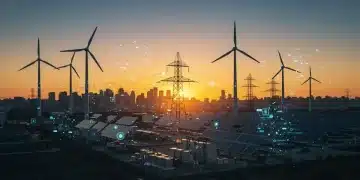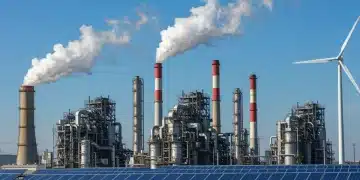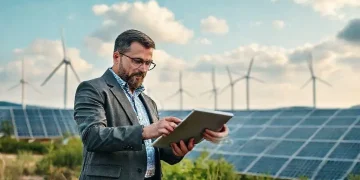US Election 2024: Potential Impacts on Clean Energy Policy
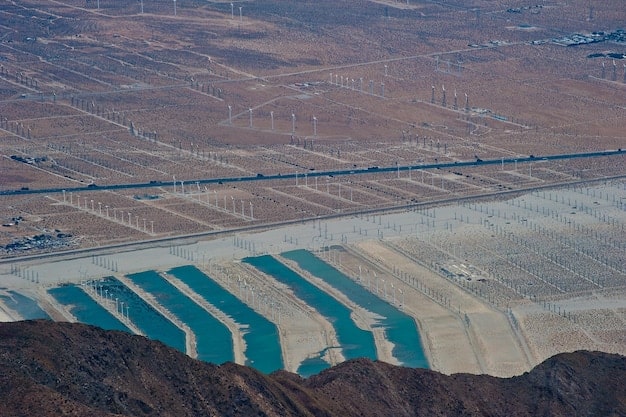
The upcoming presidential election in the US could significantly reshape clean energy policy, influencing investments, regulations, and the nation’s commitment to combating climate change.
The upcoming presidential election is poised to significantly impact the trajectory of clean energy policy in the United States. What are the Potential Impacts of the Upcoming Presidential Election on US Clean Energy Policy? Understanding these potential shifts is crucial for businesses, investors, and anyone concerned about the future of our planet.
Understanding the Current Clean Energy Landscape in the US
Before delving into the potential impacts of the election, it’s essential to understand the current state of clean energy in the US. This involves examining key policies, industry trends, and the progress made in recent years.
The US has seen substantial growth in the renewable energy sector, driven by factors such as decreasing costs of solar and wind power, supportive state and federal policies, and increasing consumer demand for sustainable energy solutions.
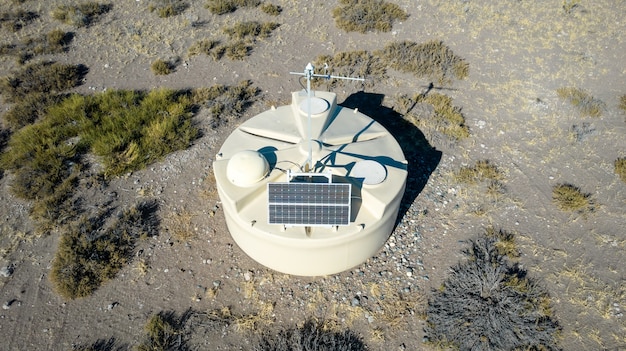
Key Federal Policies and Initiatives
Several federal policies have played a crucial role in shaping the clean energy landscape. The Investment Tax Credit (ITC) and Production Tax Credit (PTC) have incentivized investments in solar and wind projects, while the Inflation Reduction Act (IRA) of 2022 significantly expanded these incentives and introduced new provisions to promote clean energy technologies.
Furthermore, the Department of Energy (DOE) has supported research and development efforts aimed at advancing clean energy technologies, such as battery storage, carbon capture, and advanced nuclear energy.
- Inflation Reduction Act (IRA): This act provides substantial tax credits and incentives for renewable energy projects, energy efficiency improvements, and electric vehicle adoption.
- Investment Tax Credit (ITC): Offers a tax credit for a percentage of the cost of installing solar energy systems.
- Production Tax Credit (PTC): Provides a tax credit based on the amount of electricity generated from renewable sources like wind and solar.
These incentives have been instrumental in driving down the cost of clean energy technologies and making them more competitive with traditional fossil fuels.
The Republican Party’s Stance on Clean Energy
The Republican Party traditionally favors energy policies that emphasize energy independence and economic growth, often prioritizing fossil fuels. Let’s delve into the Republican party’s stance on clean energy. This involves examining their key policies, industry trends, and the progress made in recent years.
Their approach towards clean energy typically involves advocating for an “all-of-the-above” energy strategy, supporting a mix of energy sources including fossil fuels, nuclear power, and renewable energy.
Potential Policy Shifts Under a Second Trump Administration
A potential second Trump administration could lead to significant changes in US clean energy policy. The administration may seek to roll back or weaken existing regulations aimed at reducing greenhouse gas emissions, such as the Clean Power Plan.
Furthermore, a second Trump administration could prioritize fossil fuel development and seek to streamline permitting processes for oil and gas projects, potentially leading to increased production and exports. The administration may also reduce funding for clean energy research and development programs.
- Weakening of Environmental Regulations: Relaxing regulations on emissions from power plants and vehicles.
- Prioritizing Fossil Fuel Development: Encouraging increased oil and gas production through expedited permitting and leasing on federal lands.
- Reduction in Clean Energy Funding: Cutting funding for research and development of renewable energy technologies.
These policy shifts could have significant implications for the clean energy sector, potentially slowing down the pace of renewable energy deployment and hindering efforts to combat climate change.
The Democratic Party’s Approach to Clean Energy
The Democratic Party generally supports policies aimed at accelerating the transition to a clean energy economy and reducing greenhouse gas emissions. The Democratic Party generally prioritize environmental protection and sustainability.
The Democratic’s party approach to clean energy typically involves advocating for ambitious climate targets, investing in renewable energy technologies, and implementing regulations to limit pollution from fossil fuels.

Possible Policy Directions Under a Second Biden Term
A second Biden term would likely see a continuation and expansion of the current administration’s clean energy policies. This could include strengthening existing regulations, such as emissions standards for vehicles and power plants, and investing in infrastructure projects to support the deployment of clean energy technologies.
Furthermore, a second Biden administration could work to implement additional policies to promote energy efficiency, electric vehicle adoption, and the development of a clean energy workforce.
- Strengthening Clean Energy Incentives: Increasing tax credits and subsidies for renewable energy projects and energy storage systems.
- Investing in Clean Energy Infrastructure: Supporting the development of transmission lines, electric vehicle charging stations, and other infrastructure needed to support a clean energy economy.
- Promoting Green Jobs: Investing in workforce development programs to train workers for jobs in the clean energy sector.
These policies could further accelerate the transition to a clean energy economy and help the US achieve its climate goals.
Economic Impacts of Different Election Outcomes on Clean Energy
The outcome of the election could have significant economic impacts on the clean energy sector. Different policy approaches could lead to different investment patterns, job creation rates, and technological innovation trajectories.
Under a Republican administration, the clean energy sector might face headwinds due to reduced policy support and increased competition from fossil fuels. However, some segments of the industry, such as energy storage and advanced nuclear, could still see growth opportunities.
Impact on Investment and Job Creation
Clean energy investment and job creation could be significantly impacted by the election outcome. A Democratic administration is likely to pursue policies that encourage investment in renewable energy technologies and create jobs in the clean energy sector, while a Republican administration may prioritize fossil fuel development, potentially leading to job losses in the clean energy sector.
Furthermore, the election outcome could impact the competitiveness of US clean energy companies in the global market. Policies that support clean energy innovation and deployment could help US companies gain a competitive edge, while policies that favor fossil fuels could hinder their ability to compete.
The policies enacted by the next administration will play a crucial role in shaping the economic landscape for the clean energy sector.
The Role of International Agreements and Cooperation
International agreements and cooperation can play a crucial role in advancing clean energy policy and combating climate change. The US has historically been a leader in international climate negotiations, but its role has varied depending on the presidential administration.
The level of engagement and commitment to international climate agreements could depend on the outcome of the election. A Democratic administration is likely to prioritize international cooperation and seek to strengthen global climate commitments, while a Republican administration may take a more skeptical approach towards international agreements.
The Paris Agreement and Global Climate Goals
The Paris Agreement is a landmark international agreement aimed at limiting global warming to well below 2 degrees Celsius above pre-industrial levels. The US rejoined the Paris Agreement under the Biden administration and has committed to reducing its greenhouse gas emissions by 50-52% below 2005 levels by 2030.
The election outcome could impact the US’s ability to meet its climate goals and its role in global climate action. A Democratic administration is likely to prioritize the implementation of policies needed to achieve the US’s climate targets, while a Republican administration may weaken or withdraw from international climate agreements, potentially undermining global efforts to combat climate change.
The next administration’s approach to international climate cooperation could have far-reaching implications for the global fight against climate change.
| Key Point | Brief Description |
|---|---|
| 🔄 Policy Reversals | Potential changes in tax incentives and environmental regulations under different administrations. |
| ⚡ Investment Shifts | Variations in clean energy project funding depending on the election outcome. |
| 🌎 Global Impact | US’s role in international climate agreements and global efforts to reduce emissions. |
| 💼 Job Market | The creation of green jobs given the next president’s policies. |
Frequently Asked Questions
▼
A Republican administration might attempt to repeal or weaken provisions of the IRA related to clean energy tax credits and incentives, while a Democratic one would likely maintain and expand them.
▼
If the election outcome result is a Democratic administration, it would likely encourage investments in renewable energy projects. A Republican one might lead to reduced investments and a shift towards fossil fuels.
▼
Emissions regulations are likely to get stricter under a Democratic, whereas a Republican may loosen emissions regulations for power plants and vehicles
▼
International cooperation helps when achieving climate goals. A Democratic candidate will mostly prioritize it, while a Republican candidate may not emphasize international agreements in the same way.
▼
A Republican administration are likely to be in the government. Meanwhile, a Democratic one would likely invest in these technologies and create more jobs related to it.
Conclusion
The upcoming presidential election is poised to have a significant impact on clean energy policy in the United States. Understanding the potential policy shifts, economic impacts, and the role of international cooperation is crucial for stakeholders in the clean energy sector and anyone concerned about the future of our planet. The decisions made by the next administration will shape the trajectory of clean energy development and the US’s efforts to combat climate change for years to come.

